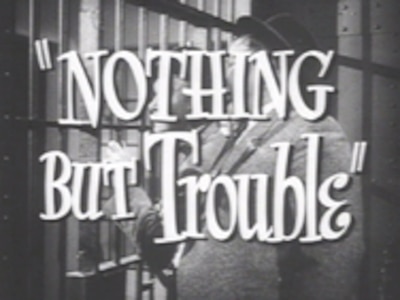Nothing But Trouble

Brief Synopsis
Cast & Crew
Sam Taylor
Stan Laurel
Oliver Hardy
Mary Boland
Philip Merivale
Henry O'neill
Film Details
Technical Specs

Synopsis
After ten years of self-imposed exile, incompetent cook Oliver Hardy and bumbling butler Stan Laurel, who hail from a long line of cooks and butlers, return to America to find work. Stan and Oliver quickly discover that, unlike the employment situation in 1932, jobs are now plentiful and servants are especially in demand due to the war. At Lorrison's Employment Agency, the men are immediately whisked away by wealthy society matron Elvira Hawkley, who needs a cook and a butler for a dinner party that evening. Meanwhile, the party's guest of honor, Christopher, the young, exiled king of Orlandia, confesses to his uncle and guardian Prince Saul that he would like to know more about "commoners." When Saul suggests to the delicate Christopher, who dreams of playing football at Notre Dame University, that he go out in disguise with his assistant, Ronetz, the young king agrees. Unknown to Christopher, Saul and Ronetz are planning to assassinate him and have instructed two men, Karel and Felken, to do the deed. While walking near a park, Ronetz finds an excuse to leave Christopher alone for a moment, but before Karel and Felken can ambush him, Christopher is lured away by the sounds of a neighborhood football game. After one of the players on the losing team drops out, Christopher asks to replace him, even though he has never actually played the game. Christopher is recruited, but the other team refuses to play without a referee, who has quit. Desperate for a chance to play, Christopher stops Stan and Oliver, who are passing by with groceries for Mrs. Hawkley's party, and begs them to fill in as referees. Stan and Oliver agree but have trouble keeping out of the players' way. To his chagrin, Christopher fumbles the ball the first time it is handed to him, but with inadvertent help from Stan and Oliver, intercepts a pass and runs for the winning touchdown. After receiving thanks from an ecstatic Christopher, Stan and Oliver realize that they forgot to buy the dinner steak and have spent all their money and used all their ration coupons. Just then, however, they hear a lion roaring at the nearby zoo and see that it is being fed steak. Oliver insists that Stan steal a steak from the lion, but Stan is too terrified to get near its cage. Stan and Oliver argue about the situation, and while the lion is distracted by their bickering, Christopher grabs the steak. When the trio arrives at the Hawkleys, Christopher, who has no idea for whom Stan and Oliver are working, claims that his cruel uncle beats and starves him and finally convinces the two servants to let him stay the night. Christopher then tries to instruct Stan on proper serving etiquette, but Stan proves to be an inept student, so the king offers to hide under the dinner table and give him helpful foot signals. When Saul arrives, he tells Mrs. Hawkley that Christopher is ill and cannot attend. During the inedible, badly served meal, Ronetz shows up and informs Saul that Christopher has disappeared. After Saul makes a hasty exit, Mrs. Hawkley finds Christopher in the kitchen, and unaware of his identity, fires Stan and Oliver and throws them all out. The trio ends up at an all-night mission, where a tramp recognizes a newspaper photograph of Christopher and reports Stan and Oliver to the police. Stan and Oliver are arrested for kidnapping, but when Christopher demands that they be hired as his servants, Saul, seeing an opportunity to frame the bumblers for the king's assassination, drops all charges. While Stan and Oliver are preparing a banquet in honor of Christopher's political enemy, Prince Prentiloff, Ronetz slips some poison into a salad he believes will be given to Christopher. Stan and Oliver switch all the salad plates around, however, and Ronetz is unable to identify the poisoned salad. As a tense Saul and Ronetz argue about the mishap, Christopher overhears them discussing his assassination and rushes to tell Stan and Oliver. Just then, Saul confronts Christopher, Stan and Oliver and, drawing a gun, forces them to stand on the skyscraper's window ledge and prepare to jump. Unknown to Saul, some painters have stuck a board out of the window below, and Christopher jumps out without harming himself. By the time Stan and Oliver are ready to jump, however, the board has been removed. While stalling, Stan and Oliver accidentally slip off the ledge and are dangling desperately when Christopher arrives with the police. After Saul, who has inadvertently eaten the poison, is carried off, Christopher, Stan and Oliver sing a rousing rendition of the Notre Dame fight song with the police.

Director

Sam Taylor
Cast

Stan Laurel

Oliver Hardy

Mary Boland

Philip Merivale
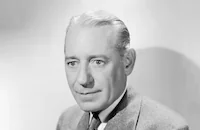
Henry O'neill
David Leland
John Warburton
Matthew Boulton

Connie Gilchrist
Chester Clute
Garry Owen
Grayce Hampton

Charles Irwin
Leland Hodgson
Robert E. O'connor
William Frambes
Tom Brannigan
Roger Mcgee
Bobby Stebbins
Robert Winkler
Jack Lindquist
Forbes Murray
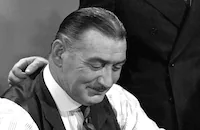
Edward Keane
Frank Darien
Eddie Dunn

Ray Teal
Johnnie Berkes
Robert E. Homans
John Vosper
John Valentine
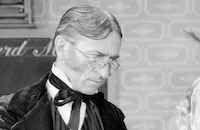
Olin Howlin
Nolan Leary
Del Henderson

Joe Yule
Mayo Newhall
William J. Holmes
Toby Doolan
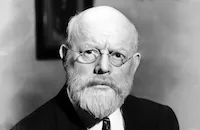
Howard Mitchell
Steve Darrell
Jean Debriac
Paul Porcasi

Lee Phelps
Robert Dudley
Tom Quinn
Edward Earle
Rita Gould
Crew
Jack Bonar
Mark Davis
Peter P. Decker
Thomas Edwards
Cedric Gibbons
Bert Glazer
Ray Golden
Margaret Gruen
Robert Halff
Irene
Standish J. Lambert
Frank B. Mackenzie
Harry Mcafee
Conrad A. Nervig
Warren Newcombe
David Ragin
Bradford Ropes
Arthur Rose
Russell Rouse
Charles Salerno Jr.
John Shea
Michael Shea
Douglas Shearer
Nathaniel Shilkret
Robert W. Shirley
Newell Sparks
William Steinkamp
Michael Steinore
John A. Williams
Edwin B. Willis
B. F. Zeidman

Film Details
Technical Specs

Articles
Nothing But Trouble
Like the Marx Brothers before them, Laurel and Hardy were tamer imitations of themselves in these late films. In striking out for better money, more control of their work and an escape from their often contentious relationship with Roach, Laurel and Hardy were forced to sign over control to the studios for whom they worked. Often they were shut out of the writing process. None of the four writers who scripted Nothing But Trouble, about a pair of bumbling domestics who help a young king escape assassination, had any experience working in silent comedy. They cannibalized the comedy team's earlier films for gags and comic bits. And the plots were less about them and their ability to generate chaos than about sympathetic young people they decided to help out. In addition, they were confined to low-budget, assembly-line productions that left them little time to improvise. Nor were they allowed to shoot in sequence, a practice that had helped them develop running gags through the course of a film.
At MGM a low-budget production was often equal to an A-picture at any other studio, so at least Nothing But Trouble had strong production values and a solid supporting cast. In particular, the comic team were helped by the presence of elderly character actor Henry O'Neill -- who had worked with them on their other MGM feature, Air Raid Wardens (1943) -- the sublimely ditzy Mary Boland, best known as the much-married Countess DeLave in The Women (1939) and sharp-tongued Connie Gilchrist, who specialized in playing servants and assorted domestics.
It also helped greatly that their director, Sam Taylor, had directed silent screen legend Harold Lloyd in some of his best films. In fact, one of the best comic bits in Nothing But Trouble, a mock suicide attempt, was adapted from a similar set of gags in Lloyd's Girl Shy (1924).
Balancing the good was an unsubtle flag-waving plot (the film was made during World War II) featuring a boy king who preached about the virtues of democracy while tossing out corny one-liners. With their films doing poorly at the box office, Laurel and Hardy eventually left Hollywood for a series of profitable tours of the British musical hall circuit (Laurel began his career there) where they could still delight audiences in their own fashion.
Producer: B.F. Zeidman
Director: Sam Taylor
Screenplay: Russell Rouse, Ray Golden, Bradford Ropes, Margaret Gruen
Cinematography: Charles Salerno, Jr.
Art Direction: Cedric Gibbons, Harry McAfee
Music: Nathaniel Shilkret
Cast: Stan Laurel (Himself), Oliver Hardy (Himself), Henry O'Neill (Basil Hawkley), Mary Boland (Mrs. Elvira Hawkley), David Leland (King Christopher), Connie Gilchrist (Mrs. Flannagan), Philip Merivale (Prince Saul), Joe Yule (Officer).
BW-70m. Closed captioning.
by Frank Miller

Nothing But Trouble
Classic Comedy Teams Collection - Abbott & Costello, Laurel and Hardy and The Three Stooges Are Featured in CLASSIC COMEDY TEAMS COLLECTION
The Abbott and Costello disc is easily the strongest. The duo was allowed to make one film a year away from their home studio of Universal so during the peak of their popularity they went three times to MGM. Two of those films are in this set and can't be found in the otherwise comprehensive four volume Best of Abbott & Costello (the third film, 1941's Rio Rita, has yet to appear on DVD). Lost in a Harem (1944) shows more of the MGM gloss than Abbott & Costello's usual films even if the story about the two rescuing a blonde singer (B-movie perennial Marilyn Maxwell) and overthrowing an evil ruler is a bit thin. The film makes good use of sets left over from Kismet and there's a song and a half from the Jimmy Dorsey band. Abbott and Costello are generally quite lively with a mix of slapstick and verbal routines, even at one point recreating the classic vaudeville bit "Slowly I Turned." Slightly more predictable is Abbott and Costello in Hollywood (1945), the first film to feature their name in the title. This time the two are show biz barbers who decide that being a talent agent is the ticket to easy money so they promote an Iowa-fresh singer over an established star. The film tends more towards a string of routines though there are some good ones including the two trying to cure Costello's insomnia, him pretending to be a stunt dummy and even a frantic chase at the end. The big missed opportunity was to exploit the Hollywood setting more; there are cameos from Lucille Ball, Rags Ragland and Preston Foster but that's about it.
Like Abbott and Costello, the Laurel and Hardy disc collects two MGM wartime films but in this case that's a bit past their prime period. Still, Laurel and Hardy bring unflappable good cheer and years of experience that give these films a charm that would certainly have been lacking if anybody else had starred. Air Raid Wardens (1943) opens with a voice-over straight out of Our Town, describing the small community that's about to participate in the war. Laurel and Hardy ran a string of failed businesses and now have been rejected by the military as well they end up as, you guessed it, air raid wardens. Not much to the warden angle so we also get Nazi spies, a stuffy bank president, a short-tempered teamster and even a rambunctious stray dog. There's a nice bit with the two trying to enter a town meeting quietly and an inventive gag with a carrier pigeon. Nothing But Trouble (1944) stretches everything a bit more thin. Seems that there's an exiled teenage king from some operetta country who just want to be a regular boy and play football. Laurel and Hardy befriend him, thinking he's just a wayward kid but not much happens. The film had been pitched a couple of years earlier and at one point involved helicopters and gags by Buster Keaton. None of that is in the final film; the studio must have decided that "Imagine Laurel and Hardy as a chef and a butler" was good enough and less expensive. Though the king's story is mostly padding, you're not likely to forget Stan trying to serve at a high-class dinner party and may even have fond memories of the two trying to grab a steak (actually horsemeat) from the lion's cage at the zoo.
The Three Stooges disc is something of an oddity since the team plays only supporting roles in both films. Meet the Baron (1933) is the more interesting since it's an example of the goofy, anything-goes comedies of the early 30s though admittedly not one of the better ones. The film was designed to put onto screen Jack Pearl, whose recreation of eternal tall tale teller Baron Munchausen had been a radio and stage smash in preceeding years (and would quickly vanish: he appeared in only one other film while his radio career trickled out). With Jimmy Durante as his buddy, the Baron crashes an all-girls college where the janitors are Ted Healey and His Stooges (that's right, not yet the Three Stooges). So you get a lot of running around, recreations of Pearl's radio skits, the Stooges pummelling each other and for good measure about thirty co-eds bathing and singing in an enormous Art Deco shower. Completing the disc is 1951's Gold Raiders, a creaky B-Western that looks like it should have appeared 15 years earlier. It's also an independent production and the only non-MGM film in this set. Gold Raiders shows that with merely a few days on the back lot and minimal editing you can keep an entire film under an hour. An aging, paunchy George O'Brien is the hero (an insurance agent!) trying to keep the local mine from being taken over by an evil landowner. The Stooges are travelling salesmen who help O'Brien but since they're incidental to the story any comedy is fleeting.
Overall the transfers in the Classic Comedy Teams Collection are sharp but the sources aren't always the best quality. Gold Raiders has some abrupt splices, including one that clips off a bit of dialogue. Lost in a Harem has a lot of speckling and in one part noticable print damage (which fortunately lasts barely a second or so). The only extras are a few trailers and subtitle options (English, French and Spanish). Still, the set is inexpensively priced and anybody interested in the films will be glad to have them.
For more information about Classic Comedy Teams Collection, visit Warner Video. To order Classic Comedy Teams Collection, go to TCM Shopping.
by Lang Thompson
Classic Comedy Teams Collection - Abbott & Costello, Laurel and Hardy and The Three Stooges Are Featured in CLASSIC COMEDY TEAMS COLLECTION
Quotes
Trivia
Notes
The working titles of this film were Help Trouble and The Home Front. According to a Hollywood Reporter news item, Sam Taylor was scheduled to both produce and direct the film, but bowed out as producer in October 1943. Nothing But Trouble was the second and last film that Laurel and Hardy made under their M-G-M contract. As with their first M-G-M effort, Air Raid Wardens , it received mediocre notices from the critics. According to modern sources, gag writers Wilkie Mahoney, Harry Crane and Buster Keaton all worked on the film's script. Modern sources note that Robert Halff, who received an "original idea" credit in the SAB, was also assigned to the screenplay.



